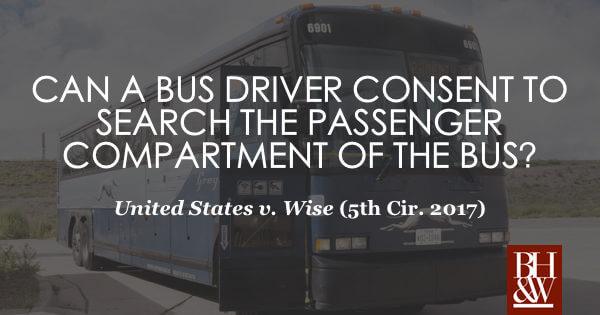Driver cannot give consent to search a passenger’s private bag.
 United States v. Cantu is an interesting case with 4th and 5th Amendment issues coming out the Fifth Circuit. Of course, it’s an unpublished opinion, so it has no precedential value, but it’s a good case on federal criminal procedure.
United States v. Cantu is an interesting case with 4th and 5th Amendment issues coming out the Fifth Circuit. Of course, it’s an unpublished opinion, so it has no precedential value, but it’s a good case on federal criminal procedure.
The Fifth Circuit Court of Appeals (Federal) held that an officer’s warrantless search of Appellant’s handbags, during a traffic stop, violated the Fourth Amendment. Although the driver consented to search of the vehicle, he had neither the actual nor the apparent authority to consent to a search of his passenger’s property. The officer had no authority to search inside Appellant’s closed bags without her consent, which he neither sought nor obtained, and he knew the bags he was searching belonged to her.
After Appellant’s arrest, while being transported to jail, she made incriminating statements to the officer, without having been properly Mirandized. Approximately 4.5 hours later, DEA agents met with Appellant, Mirandized her, obtained a valid waiver and obtained a written confession from her.
The court held that the DEA interrogation and resulting confession were not tainted by the arresting officer’s earlier Miranda violation while transporting Appellant to the jail. There was little continuity between the two interrogations. The arresting officer asked his questions in his patrol car, while different personnel working for a different agency conducted the later DEA interview in a different location. There was a 4.5-hour break between the two interrogations and the DEA agents, in their interview, did not exploit or refer back to Appellant’s earlier statements.
Additionally, the court refused to suppress Appellant’s written confession to the DEA agents based on the arresting officer’s illegal search of her bags. The court held that the illegality of the search was clear however, the connection between the evidence it produced and Appellant’s confession to the DEA agents was weak. There was nothing to indicate that the discovery of a small amount of marijuana in the bags compelled Appellant to confess to possession of a large quantity of cocaine later found hidden in the vehicle. Further, Appellant was provided Miranda warnings, interviewed by different officers from a different agency and approximately seven hours had passed between the search of Cantu’s purse and the receipt of her written confession.
The full circumstances of the DEA interrogation served to purge the taint of the earlier illegal search.










